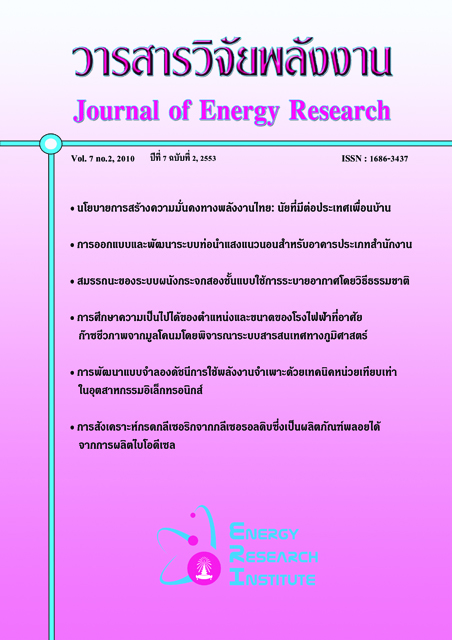นโยบายการสร้างความมั่นคงทางพลังงานไทย: นัยที่มีต่อประเทศเพื่อนบ้าน
Main Article Content
Abstract
หลังยุคสงครามเย็นเป็นต้นมาถึงปัจจุบัน ประเด็นเรื่องพลังงานจัดเป็นภัยคุกคามรูปแบบใหม่ซึ่งบั่นทอนความมั่นคงของรัฐทั่วโลก ดังนั้น การแก้ไขปัญหานี้ส่วนหนึ่งคือ จึงมุ่งเน้นไปที่การสร้างความร่วมมือทางพลังงานโดยเฉพาะอย่างยิ่งกับประเทศที่ส่งออกพลังงานตลอดจนประเทศเพื่อนบ้าน สำหรับประเทศไทยนั้น วิกฤตทางพลังงานโดยเฉพาะน้ำมันหลายครั้งที่ผ่าน การเจริญเติบโตทางเศรษฐกิจ ผสานกับปัจจัยการเมืองระหว่างประเทศ ได้ผลักดันให้ไทยจำเป็นต้องสร้างความสัมพันธ์เชิงความร่วมมือกับประเทศเพื่อนบ้านในรูปแบบต่างๆ อันได้แก่ การซื้อขายพลังงาน และความร่วมมือแก้ไขข้อพิพาทแหล่งทรัพยากรทางพลังงานกับประเทศเพื่อนบ้าน อันได้แก่ ก๊าซธรรมชาติ และเขื่อนไฟฟ้าพลังน้ำ โดยเฉพาะอย่างยิ่งในช่วงทศวรรษที่ 1990- ค.ศ. 2006 ซึ่งเป็นช่วงที่ไทยและประเทศเพื่อนบ้านสามารถบรรลุข้อตกลงความ
Thailand’s Energy Security Policy: The Implications for Its Neighbors
Since Post Cold War up until now, energy issue can be classified as a new form of threat that undermined state stability all over the world. Therefore, co-operation in terms of energy, particularly with energy exporting countries and also with neighbouring countries, could be seen as part of solution. As forThailand, several oil energy crisis, economy growth plus international politic factors forcedThailandto create policy in the use of co-operation such as energy trading co-operation to solve energy resource disputes with them. The disputes include natural gas and hydropower issues, particularly between the decades of 1990 to 2006. It was the moment thatThailandand its neighboring countries could reach considerable mutual agreements of energy co-operation which the levels of success are various.

